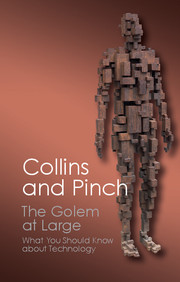Book contents
- Frontmatter
- Dedication
- Contents
- Preface and acknowledgements
- Introduction: the technological golem
- 1 A clean kill?: the role of Patriot in the Gulf War
- 2 The naked launch: assigning blame for the Challenger explosion
- 3 Crash!: nuclear fuel flasks and anti-misting kerosene on trial
- 4 The world according to Gold: disputes about the origins of oil
- 5 Tidings of comfort and joy: Seven Wise Men and the science of economics
- 6 The science of the lambs: Chernobyl and the Cumbrian sheepfarmers
- 7 ACTing UP: AIDS cures and lay expertise
- Conclusion: the golem goes to work
- References and further reading
- Index
3 - Crash!: nuclear fuel flasks and anti-misting kerosene on trial
Published online by Cambridge University Press: 05 June 2014
- Frontmatter
- Dedication
- Contents
- Preface and acknowledgements
- Introduction: the technological golem
- 1 A clean kill?: the role of Patriot in the Gulf War
- 2 The naked launch: assigning blame for the Challenger explosion
- 3 Crash!: nuclear fuel flasks and anti-misting kerosene on trial
- 4 The world according to Gold: disputes about the origins of oil
- 5 Tidings of comfort and joy: Seven Wise Men and the science of economics
- 6 The science of the lambs: Chernobyl and the Cumbrian sheepfarmers
- 7 ACTing UP: AIDS cures and lay expertise
- Conclusion: the golem goes to work
- References and further reading
- Index
Summary
The general public made the point, ‘well that's all right, but we've got to take the word of you experts…for it – we're not going to believe that, we want to see you actually do it’. So well, now we've done it.…they ought to be [convinced]. I mean, I can't think of anything else. – If you're not convinced by this,…they're not going to be convinced by anything.
These words were uttered in 1984 by the late Sir Walter Marshall, chairman of Britain's then Central Electricity Generating Board (CEGB). The CEBG used the rail system to transport spent nuclear waste from its generating plants to its reprocessing plants. In spite of the fact that the fuel was contained in strong containers, or flasks, the public was not happy. The CEGB therefore arranged for a diesel train, travelling at a hundred miles per hour, to crash head-on into one of their flasks to show its integrity. Sir Walter's words were spoken to the cameras immediately following the spectacular crash, witnessed by millions of viewers either on live television or on the nation's televized news bulletins. Sir Walter was claiming that the test had shown that nuclear fuel flasks were safe. (The source from which Sir Walter's quotation was taken and of the basic details of the train crash is a video film produced by the CEGB Department of Information and Public Affairs entitled ‘Operation Smash Hit’.)
- Type
- Chapter
- Information
- The Golem at LargeWhat You Should Know about Technology, pp. 76 - 100Publisher: Cambridge University PressPrint publication year: 2014



